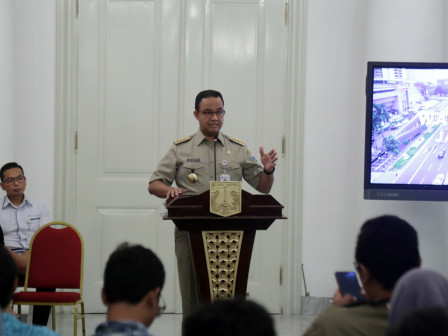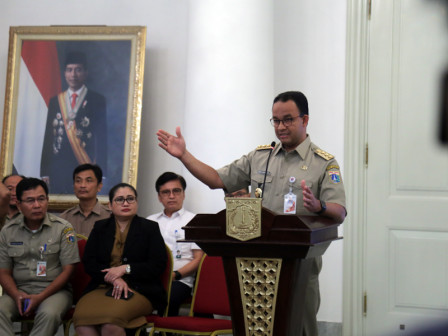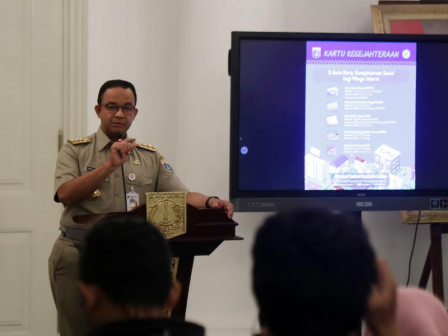Anies' Two Years Leadership, From Transjakarta, MRT and LRT Heading to Jak Lingko Transportation Integration
Reported by Budhi Firmansyah Surapati | Translated by Maria Inggita
Anies' Two Years Leadership, From Transjakarta, MRT and LRT Heading to Jak Lingko Transportation Integration
The Sustainable Transportation Award demonstrates the political will that the city is fully capable of putting solution effectively to improve the city environment
"The Sustainable Transportation Award demonstrates the political will that the city is fully capable of putting solution effectively to improve the city environment," said Aimee Ganthier of the 2020 Sustainable Transport Award Committee who awarded Honorable Mention to Jakarta.
Quoting the Jakarta PPID press release, Tuesday (10/15), Jakarta together with the City of Pune in India and Kigali in Rwanda, received the international award because of the Bus Rapid Transit (BRT) system that is fast, convenient, safe, and on time.
Anies' Two Years of Leadership: Jakartans Enthusiastically Welcome Zero-Down Payment Housing ProgramTransjakarta
Transjakarta buses run on the longest track in the world, which is 251.2 kilometers. From 2004 - 2017, the average daily Transjakarta bus passenger range was 300,000 passengers per day. In 2019, the average number of passengers has doubled, around 641,000 passengers per day. The number of fleets in the last three years has also increased, in 2017 totaling 2,380, 2018 totaling 3,017, and 2019 totaling 3,548 buses. The first BRT in Southeast and South Asia is targeted to reach 3,565 units by the end of 2019.
Having 260 shelters spread across 13 corridors, the TransJakarta Public Service Obligation (PSO) has increased ten times more, from Rp 333,084,520 in 2011 to Rp 4,197,240,979 in 2020. In 2019, TransJakarta bus facilities are integrated with two other modes of rail-based transportation, namely MRT at the HI Roundabout and LRT on Jalan Pemuda. Three electric buses have also undergone trials this year, to tackle air pollution in the Capital City.
Mass Rapid Transit (MRT)
Since its operation was inaugurated on March 24, 2019, MRT has become the belle of the most modern public transportation in Jakarta and the only one in Indonesia. The Ratangga train passes 13 Phase 1 stations, from Lebak Bulus to the Hotel Indonesia Roundabout, along 16 kilometers every day. Six kilometers of of the lane are built underground through six stations, namely Senayan, Istora, Bendungan Hilir, Setiabudi, Dukuh Atas, and Hotel Indonesia Roundabout. While the remaining ten kilometers are elevated structures that pass through seven stations, namely Lebak Bulus, Fatmawati, Cipete Raya, Haji Nawi, Blok A, Blok M, and Sisingamangaraja. While the train depot is adjacent to the Lebak Bulus Station, which became the first meeting place for Jokowi and Prabowo Subianto on July 13, 2019, after the presidential election.
This transportation is managed by PT Mass Rapid Transit Jakarta (PT MRT Jakarta), which was established on June 17, 2008. This Regional-Owned Enterprise (BUMD) is planning the construction of the North-South Jakarta MRT corridor Phase 2 of the HI Roundabout-Kota, in addition to the corridor of East-West Jakarta MRT Phase 3 Kalideres-Cempaka Baru. Phase 2 MRT construction is planned for 2020 and is targeted to be completed four years later.
PT MRT Jakarta targets the number of daily passengers to reach 100,000 by the end of 2019. Until July 2019, the average number of Jakarta MRT users reached 94,824 people per day, up 15.9 percent from the previous month. The arrival time, travel time and train stop time at the MRT station reached 100 percent of the total 6,159 train trips.
Light Rail Transit (LRT)
Integrated Railroad or Light Rail Transit (LRT) is a passenger transportation service mode that operates on light rail. Although the average speed is around 50 kilometers per hour, Jakarta LRT trains can reach a maximum speed of up to 90 kilometers per hour.
The Jakarta LRT train is made by Hyundai Rotem from South Korea which has advantages by using the articulated bogie system. This technology, which is first implemented in Indonesia, allows trains to drive safely and flexibly, following the contours of the track in sharp turns.
Besides being comfortable and having international standards, LRT can also save time around 13-15 minutes from Kelapa Gading, North Jakarta to Velodrome Station, East Jakarta. If you continue on foot through the skybridge from Velodrome Station to Pemuda Rawamangun Shelter, then continue by taking the TransJakarta bus to Dukuh Atas Bus Stop, it will take around 40 minutes. So when accumulated, the total travel time with the integration of the Jakarta LRT and Transjakarta buses from Kelapa Gading to Dukuh Atas ranges from 55-60 minutes.
Since June 11, 2019, Jakarta LRT has been tested for free through six stations, namely Pegangsaan Dua, Pulomas, Boulevard Utara, Boulevard Selatan, Equestrian, and Velodrome. From 11 June to October 13, 2019, LRT Jakarta has served 798,000 passengers. Jakarta LRT operates from 6AM to 10PM on Monday-Friday and 7AM-11PM on Saturday-Sunday.
Integrated Transportation System (Jak Lingko)
Jak Lingko is an integrated transportation system in terms of routes, infrastructure and payments. This integration does not only involve large, medium and small buses and TransJakarta, but also rail-based transportation owned by the Jakarta Provincial Government such as the MRT and LRT.
The Jak Lingko system also integrates infrastructure with PT. KCI and Railink owned by PT. KAI. An example of this integration can be seen in Dukuh Atas, where four modes of public transportation are conveniently connected through pedestrianization of Jalan Kendal and wide sidewalks.
The name Jak Lingko is taken from two words, namely Jak which means Jakarta and Lingko which means networking or integration (taken from the customary rice field system in Manggarai, East Nusa Tenggara). This name was chosen because it reflects the meaning of the integrated transportation system that is being built in the Capital City.
Jakarta Provincial Government is targeting 10,047 small, medium and large integrated fleet of Jak Lingko and will be rejuvenated soon next year.
"For the implementation of the age limitation of public transport vehicles, that is ten years, will be realized in 2020," said the Head of Jakarta Provincial Transportation Agency, Syafrin Liputo.
Cashless payment system with a Jak Lingko card costs a maximum of Rp 5,000 per three hours, specifically for road-based transportation. For example, if you take a TransJakarta bus at 7AM, then take an angkot that has the Jak Lingko logo at 8.30AM, and return on the TransJakarta bus at 10 AM, then the balance on your Jak Lingko card will decrease by Rp 5,000.
The Jak Lingko card with a value of Rp 30,000 with a balance of Rp 10,000 can be topped up through ATMs of Bank DKI and BNI. With this convenience, the target of public transport passengers in Jakarta will reach 260 million people in 2019, up from 145 million passengers in 2017 and 190 million in 2018. In addition to reducing air pollution by moving from private vehicles to public transportation, congestion is also reduced from the number four to seventh in the world.
This integration is strengthened in collaboration with the Jakarta Transportation Discussion Forum (FDTJ) and the Kreavi creative community, to put up information boards around public transportation at 28 Sudirman Corridor non BRT shelters. The information posted is in the form of maps, markers and wayfinding to facilitate the public and foreign tourists in using public transportation in Jakarta.
Jakarta Governor Anies Baswedan, said that the installation of public transportation information is a serious collaboration between Jakarta Provincial Government and citizens in realizing the City 4.0 concept in the Capital City.
The expansion of the odd-even system from nine to 25 roads that began on September 9, 2019, also diverts people from private vehicles to public transportation. The Kompas daily poll published on October 6, 2019 revealed that 42 percent of respondents chose to take public transportation using TransJakarta buses, MRT, or Commuterline trains.
The evaluation of Jakarta Provincial Government during the trial period for the even odd expansion from August 12, 2019 to September 6, 2019, the volume of vehicles indeed decreased by 25.24 percent. By moving from private vehicles to public transportation, congestion has also reduced from number four to seventh in the world, it also reduces air pollution.



